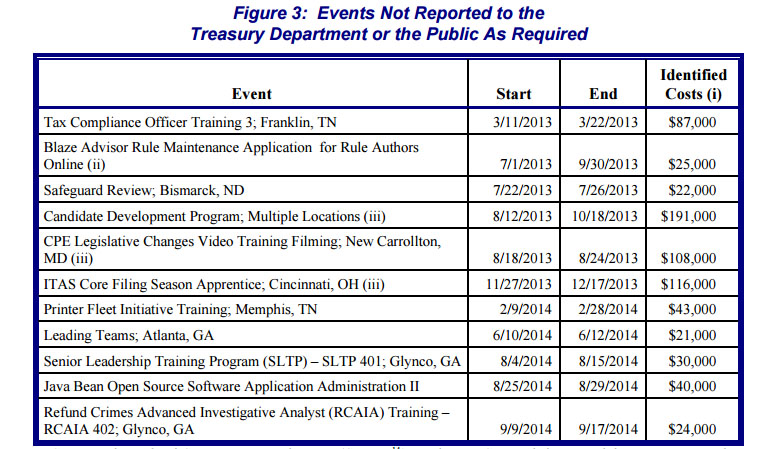IRS seeing improvements on conference price tags, reporting
A Treasury Inspector General for Tax Administration audit found that the IRS is learning from past mistakes related to conference spending. But the tax watchdog...
The Internal Revenue Service is improving how it monitors and reports conference spending, but it could do a better job centralizing those reports and categorizing certain events.
A Treasury Inspector General for Tax Administration audit made public March 21 found the IRS was following auditor recommendations that stem from a conference spending controversy. The audit looked at IRS conference spending for 650 events between fiscal years 2013 and 2014.
“Our auditors found that, during fiscal year 2013 and 2014, the IRS approved and reported, as required, almost 99 percent of the training and conference events we reviewed,” said Treasury Inspector General for Tax Administration J. Russell George in a statement. “It is imperative that agencies effectively manage conference and event spending to ensure that taxpayer funds are used efficiently.”
The final report is a follow up to a May 2013 TIGTA audit. At the time, the IRS was under scrutiny for a 2010 conference that cost more than $4 million.
“This report presents the results of our review to determine whether the IRS implemented corrective actions in response to our previous recommendations regarding conference spending and to evaluate the IRS’s approval and reporting process for conference and event spending exceeding established thresholds,” wrote TIGTA’s Deputy Inspector General for Audit Michael McKenney.
Auditors made three recommendations based on their latest findings:
- Requiring the IRS to submit annual final accounting for all events with $100,000 or larger price tags
- Make sure events that cover the same material at the same location on the same day be counted as one event
- Centralize reports and related documentation
In a statement included in the final report, IRS acting Chief Financial Officer Jeffrey Wallbaum said the agency agreed with the recommendations and it has “already developed and implemented corrective actions to address them.”
Reporting as required
The latest audit shows that the IRS reported as required about 99 percent of the 650 audited events.
The outstanding 1 percent is made up of eight events that were not reported as required to the Treasury Department and three events were not reported public as required.

One of the eight events that should have been reported to Treasury was reported as canceled with no costs despite the fact it occurred, auditors found.
The IRS told TIGTA in the audit that the reasons for the unreported events largely stemmed from not having “effective mechanisms” for reporting in the early months of fiscal 2013. The more expensive events took too much time to report to the Treasury Department, which in turn could not report the events to the public.
“Without an effective mechanism for reporting events costing more than $100,000 in a timely manner, the IRS risks noncompliance with federal requirements for reporting of conference spending,” the audit advised.
‘Appropriately approved’
While more than 90 percent of the 650 events reviewed by TIGTA were “appropriately approved” by the IRS, several dozen were not.
Auditors found that 55 of the events “did not receive the correct level of approval, including 45 events that did not receive the IRS Commissioner’s approval and 10 events that did not receive the required approval from the Treasury Department,” the report stated.
Auditors explained that there were several reasons why the correct level of approval was not reached:
- An IRS Deputy Commissioner approved events instead of the acting IRS Commissioner.
- An event did not include travel costs, so it was approved by the wrong official based on a lower cost estimate.
- An event was approved as two separate events even though it was held at the same time, place and with the same content.
Other concerns highlighted by auditors included the issue that 26 events went above approved costs by more than 15 percent, which is the limit before an event requires re-approval.
“Of these, 23 events exceeded the estimated costs by more than 15 percent of the originally approved amount, and the IRS did not notify the IRS Commissioner or the Treasury Department of the updated costs for reapproval,” the report stated. “However, we were unable to determine whether these cost overruns were known prior to the event taking place. The remaining three events had specific cost limits included in approval documents that were less than the standard 15 percent limit. For these three events, actual costs exceeded the capped amount specifically stated in the approval document. Because the IRS did not follow the requirements of the guidance for reapproval for the 26 events, an additional $245,820 was incurred without the appropriate approval.”
Another issue auditors found was that the IRS did not have a centralized spot for keeping its approval documentation. This caused problems in both timing and completion of information requests, auditors said.
“Because of the requirement for tracking these events, the IRS would benefit from a centralized event approval and reporting process that ensures a limited number of offices are responsible for the final tracking and reporting of event information as well as maintaining all event documentation,” the audit stated.
Guidance issued, action taken
Auditors did credit the IRS with learning from the last report issued 3 years ago.
Among the guidance issued was:
- Encouraging the use of IRS event planning resources
- Requiring a justification for planning trips be included in event approval packages
- Tracking event-related spending
The actions include:
- Creation of the Service-wide Video Editorial Board to oversee video projects
- Updated requirements for getting Continuing Professional Education credits
- Issuing W-2 forms for taxable travel to 11 employees
“By implementing these policy updates, the IRS has improved tracking and reporting and reduced miscellaneous costs associated with event spending,” the audit stated.
Copyright © 2025 Federal News Network. All rights reserved. This website is not intended for users located within the European Economic Area.



